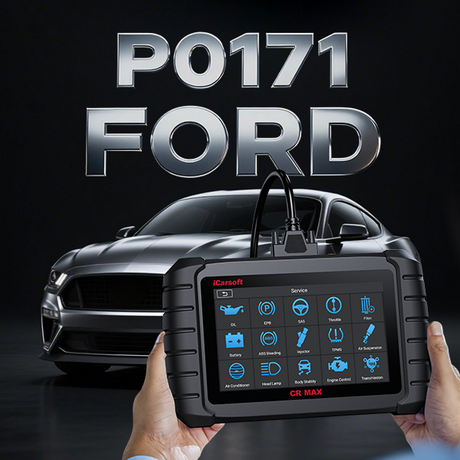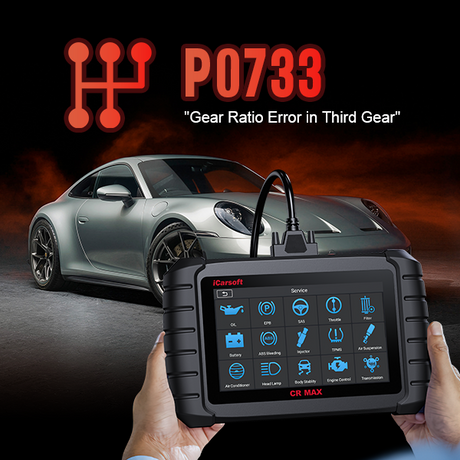Table of Contents
- 1. What Is an Engine Coolant Temperature Error?
- 2. Common Causes of Coolant Sensor Issues
- 3. Which Vehicles Are Prone to This Code?
- 4. Symptoms of a Coolant Sensor Problem
- 5. How Serious Is This Coolant Issue?
- 6. Can You Drive with a Coolant Error?
- 7. Tools Needed to Diagnose This Code
- 8. Steps to Fix Coolant Temperature Errors
- 9. Cost Estimates for Resolving This Issue
- 10. Tips to Prevent Coolant Sensor Errors
- 11. Additional Features of iCarsoft CR MAX
The P0118 error, also known as an engine coolant temperature error, occurs when the Engine Control Module (ECM) detects an issue with the coolant temperature sensor. This problem can affect vehicles like the P0118 Honda and P0118 code Chevy, leading to performance issues and potential engine damage. In this article, we’ll explore the causes, symptoms, and solutions for this diagnostic trouble code, and show how the iCarsoft CR MAX can help. For related issues, check out our guides on P0116 and P0117.
1. What Is an Engine Coolant Temperature Error?
The P0118 code is triggered when the Engine Control Module (ECM) receives a signal from the coolant temperature sensor (also called the ECT sensor) that’s outside the expected range. This sensor measures the temperature of the engine coolant, helping the ECM adjust the air-fuel mixture and ignition timing. In vehicles like the P0118 Honda or P0118 code Chevy, a faulty sensor can lead to incorrect adjustments, causing performance issues or an overheating engine.

Note: P0118 indicates a high voltage signal from the ECT sensor, often due to a circuit issue. In contrast, a P0116 code points to inconsistent coolant temperature readings, while P0117 indicates a low voltage signal.
2. Common Causes of Coolant Sensor Issues
Several factors can lead to a coolant sensor issue. Here are the most common causes:
- Faulty ECT Sensor: Over time, the coolant temperature sensor can fail due to wear, high temperatures, or electrical faults, sending incorrect signals to the ECM.
- Wiring and Connector Problems: Damaged, corroded, or loose wiring and connectors between the sensor and ECM can disrupt signal transmission, especially in vehicles exposed to moisture or road salt.
- Cooling System Problems: Low coolant levels, a failing water pump, or a clogged radiator can cause abnormal coolant temperatures, leading the sensor to report incorrect data.
In a P0118 Honda, corrosion in the sensor’s connectors is a frequent issue due to humid climates, while a P0118 code Chevy might often stem from low coolant levels caused by leaks.

3. Which Vehicles Are Prone to This Code?
This diagnostic trouble code can appear in a wide range of vehicles, including domestic and foreign cars, trucks, and SUVs. Brands like Ford, GM, Toyota, Honda, and Volkswagen are all susceptible, as the coolant temperature sensor is a standard component in internal combustion engines. For example, a P0118 Honda might occur in models like the Civic or Accord, while a P0118 code Chevy is common in vehicles like the Silverado or Impala.
4. Symptoms of a Coolant Sensor Problem
When a coolant sensor issue occurs, you may notice these symptoms:
- A glowing check engine light on your dashboard
- Inaccurate temperature gauge readings, showing the engine as too hot or too cold
- Engine performance issues, such as rough idling, hesitation, or reduced power
- Increased fuel consumption due to an improper air-fuel mixture
In a P0118 code Chevy, you might notice difficulty starting the engine in cold weather, while a P0118 Honda may exhibit rough idling during acceleration.
5. How Serious Is This Coolant Issue?
An engine coolant temperature error is moderately serious. While it doesn’t immediately make the vehicle undrivable, ignoring it can lead to bigger problems. Incorrect temperature readings can cause the engine to run with an improper air-fuel ratio, increasing wear over time. Worse, if the engine is overheating but the gauge shows a false reading, it could result in severe damage like a warped cylinder head or blown head gasket.

6. Can You Drive with a Coolant Error?
You can drive with this issue, but it’s not advisable. An overheating engine might go unnoticed due to inaccurate readings, risking severe damage. If you must drive, watch for signs of trouble like steam from the engine bay, a sweet smell (indicating coolant leakage), or unusual engine noises. It’s best to diagnose and fix the problem as soon as possible.
7. Tools Needed to Diagnose This Code
To diagnose this diagnostic trouble code, you’ll need these tools:
- Vehicle Diagnostic Tool: An OBD-II scanner, like the iCarsoft CR MAX, can read the code and freeze-frame data, showing the vehicle’s conditions when the error occurred.
- Multimeter: Use a multimeter to test the ECT sensor’s resistance and check for voltage drops in the wiring.
- Infrared Thermometer: A non-contact thermometer helps verify the actual coolant temperature, ensuring the sensor’s readings are accurate.

8. Steps to Fix Coolant Temperature Errors
Follow these steps to resolve the issue using a diagnostic tool:
- Locate the OBD-II port (usually under the dashboard) and connect a diagnostic tool like the iCarsoft CR MAX.
- Turn on the ignition (without starting the engine) and power on the tool to communicate with the ECM.
- Use the tool to read the diagnostic trouble code and any related codes.
- Inspect the coolant temperature sensor and its wiring for damage, corrosion, or loose connections.
- Test the sensor’s resistance with a multimeter, comparing results to the manufacturer’s specifications.
- Replace the sensor if faulty, or repair damaged wiring and connectors as needed.
- Clear the code using the diagnostic tool, then start the engine to ensure the issue is resolved.
For a P0118 Honda, replacing the sensor often fixes the issue, while a P0118 code Chevy might require addressing coolant leaks first.
9. Cost Estimates for Resolving This Issue
The cost to fix an engine coolant temperature error varies:
- ECT sensor replacement: $50–$100
- Professional labor: $50–$150
- Wiring repairs: $50–$300 (depending on damage extent)
- Total estimated cost: $100–$450
Costs may be higher for a P0118 code Chevy if extensive wiring repairs are needed due to corrosion.
10. Tips to Prevent Coolant Sensor Errors
To avoid future coolant sensor issues, follow these tips:
- Check and replace coolant every 30,000 miles to prevent corrosion in the cooling system.
- Inspect the sensor’s wiring and connectors regularly for wear or corrosion.
- Use high-quality replacement sensors to ensure accurate readings and durability.
Tip: Regular cooling system maintenance can prevent issues in vehicles like the P0118 Honda or P0118 code Chevy. Always use the recommended coolant type for your vehicle, such as Honda Type 2 or GM Dex-Cool.
11. Additional Features of iCarsoft CR MAX
The iCarsoft CR MAX is a versatile diagnostic tool. Beyond resolving coolant temperature errors, it can read and clear codes from systems like the transmission, ABS, airbags, and emissions. It also offers live data streaming, letting you monitor real-time parameters like engine RPM, throttle position, and oxygen sensor readings, which are useful for performance tuning and overall vehicle health checks.














